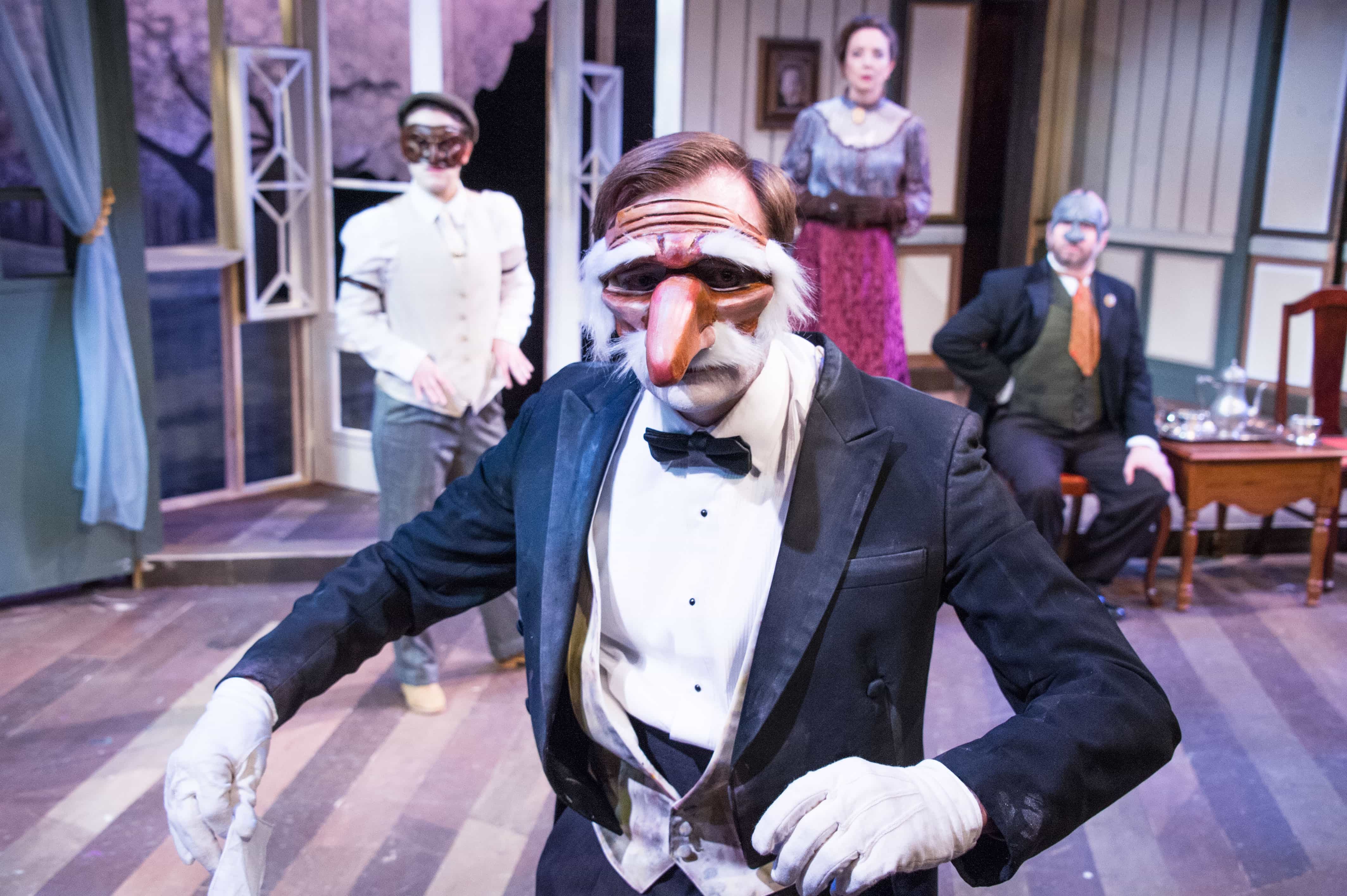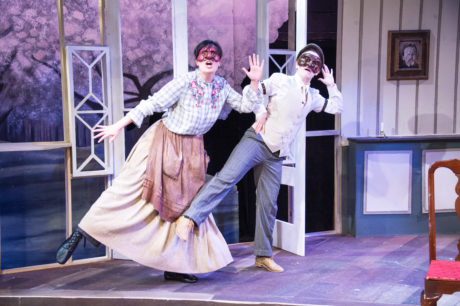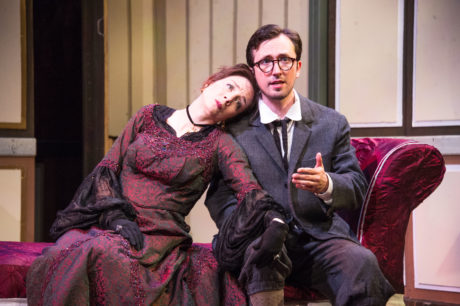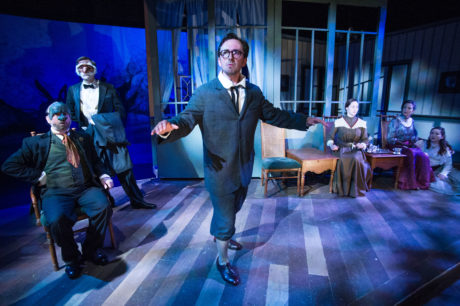Though it has commonly been staged as a tragedy or psychological drama since its Moscow premiere, Anton Chekhov always insisted that The Cherry Orchard was a comedy. A story about an aristocratic family’s loss of ancestral land due to the gradual collapse of the feudal order might seem tragic – at least for the aristocratic Ranevsky family – but a story in which masters, servants, and lovers experience such constant reversals of fortune and subvert societal norms is indebted to the commedia dell’arte tradition. So it should not be surprising that a commedia dell’arte troupe like Faction of Fools has decided to collect on the debt, and seize the property–house, orchard, and billiard table included.

It is the turn of the last century and Lubov Ranevsky (Sara Barker) has returned to her estate after a five-year exile sparked by her son’s death by drowning when her seventeen-year-old daughter, Anya (Amber James) and her governess Charlotte (Casey Johnson-Pasqua) after they hear news of a suicide attempt, fetch Lubov from the Parisian apartment which she shared with her lover.
In Lubov’s absence, the estate’s fortunes have declined. Some forty years prior, as a movement towards modernization, where once the serfs had been attached to the lands that the aristocrats owned. As peasants – be they groundskeepers, farmers, or house servants – gained the freedom to seek other employers, or move into the city, or even enter the middle class, they took the very skills that made these ancestral estates profitable for the landowners. So while the Ranevsky cherry orchard is so renowned, as Lubov’s pedantic brother Leonid Gaev (Jesse Terrill, who also composes the production’s jaunty, circus music) reminds everyone, to warrant an entry in the Encyclopedic Dictionary, no one remembers the art of drying, preserving, or pickling the cherries, let alone getting them to the marketplace – indeed, it is only the eighty-seven-year-old house servant Fiers (Jack Novak) who seems to even remember such things once were done.
Ermolai Lopakhin (Kathryn Zoerb), the son and grandson of serfs who once worked on the estate, has become an immensely successful businessman, and out of some sentimental affection for his former masters, tries to sell Lubov and Leonid on a plan that would get them out of debt and perhaps save some part of the estate.

The question is: how well is this story translated into a physical comedy of grotesque masks, slapsticks, pratfalls, and funny walks?
The answer is: so long as Faction of Fools is doing the translation, quite well, thank you.
Director Paul Reisman and the cast mine plot, dialogue, and character interactions for collisions, lazzi (stock commedia routines), and highly choreographed ensemble clowning that seems to fall naturally in between the words. Sometimes it just takes a clown to teach us that a tumble is the perfect punctuation for a soliloquy.
Lopakhin’s constant wheeling-and-dealing, which in an aristocratic tragedy, might be dismissed as the vulgarity of the nouveau-riche, remains vulgar, but vulgarity is often what makes the Zanni (comic servant) of the commedia endearing, especially in Zoerb’s fast-talking, foot-shuffling, constantly gesticulating interpretation. He still loves the family that once owned his family and is even prepared to grovel if they would only let him help them.
Barker’s Lubov is a brilliant study in comic contradictions. She is caught in her tragic historical role as the last Ranevsky to own the family estate. However she is also possessed of a lusty subconscious that expresses itself in physical comedy, precisely with awkward (yet skillfully choreographed) failed seductions of the very men she hopes to persuade to wed her daughters: Peter Trofimov (Danny Cackley) the “eternal student” for Anya, and Lopakhin for Varya (Julia Klavans) her adopted older daughter who has been managing the estate in her absence.
Francesca Chilcote is hilariously ribald as the servant Dunyasha (she doubles as the Ranevskys’ equally foolish with money yet luckier aristocratic neighbor Pishchik), excited about the return of her long-absent mistress, but even more excited about the return of her valet, Yasha (played by Novak) whose newfound sophistication in Paris means that he has adopted the mannerism and makeup of the classic French white-face clown. Willing as he is to couple with the impassioned Dunyasha in every corner of the estate house, Yasha wishes to return to Paris, where imagines himself belonging amongst the elite. There’s a wonderful counterpoint in Novak’s double roles: as Yasha, who makes a point of being even more physically graceful and pretentiously arrogant than his employers, and his other role as the stooped over, slow-moving arthritic Fiers, who pines for the day when he was as much property as the century-old bookshelf in the library.

Cackley also plays a contrapuntal double role. On the one hand, he plays Peter, the tutor who never finished his university degree and never left the estate even after his student drowned. An ineffectual romantic in philosophy and love, Peter bobs like a helium balloon that would float away were it not tethered, and is unable to pursue Anya because he wants to avoid baseness. On the other, Cackley plays the clumsy and romantically frustrated estate clerk Epikhodov, aptly nicknamed “Two-and-Twenty-Troubles” because of his inability not to hit the ground.
James’ Anya is appropriately giddy as a teenager, who, despite the collapse of the only way of life she has known, is nonetheless excited for the dizzying possibilities before her – of course, amplified through the idiom of commedia. Meanwhile, Klavans plays Varya in a manner most recognizable as a “naturalistic” dramatic character. She is older, more aware of what possibilities are currently available and which are denied and resigned to whatever fate will decide.
Johnson-Pasqua’s Charlotta, as the abandoned daughter of wandering circus performers, is charismatic as the playmate to Anya and Varya and ringleader for the Ranevskys’ entertainments. A recent graduate of Gallaudet University, where Faction of Fools has been in residence since 2011, she delivers her dialogue in American Sign Language – and the way the kinesthetic grammars of the language and the performance styles of commedia work in tandem demonstrates the fruitfulness of the ongoing collaboration between theater company and university.
Set Designer Ethan Sinnott has created the illusion of a vast space in the small Eastman Studio Theatre. The estate’s windows are tall and provide a grand view of the titular orchard of monochromatically painted trees extending as far as the eye can see, and passages leading what one guesses to be a booby-trapped labyrinth for two-times two-and-twenty troubles. Kristin A. Thompson’s lighting design, meanwhile, allows the paneling of the nursery to change colors with the time of day and the seasons, from sky and navy blue at dawn to olive green and cream in sunlight.

Kitt Crescenzo creates an extraordinary range of costumes for the large cast of characters, defining them by class and individual characteristics – with subtle gradations ranging from elegant fashions made of fine fabrics Lubov brings back from Paris to the ill-fitting yet well-worn outfits of the estate’s house servants.
Of course, The Cherry Orchard is not simply a classic from the early days of the last century that can be mined for comic reinvention. Like Chekhov’s characters, we too are living through a period of economic disruption. The norm of full-time work is being replaced by gigs and contracts, while entrepreneurs seem to compete on who can create the business plan that comes closest to a pyramid scheme without running afoul of the law. Indeed, much as with Konstantin Stanislavski’s 1904 premiere, it is hard to see the comedy when tragedy is so close at hand. Perhaps Chekhov’s play as imagined by the Faction of Fools is what we need to laugh at our current era.
Running Time: Two hours, with a 15-minute intermission.
The Cherry Orchard plays through June 10, 2018, at Gallaudet University’s Eastman Studio Theatre – Florida Avenue & 8th Street, NE, Washington, DC. For tickets, call 1-800-838-3006 or go online.




